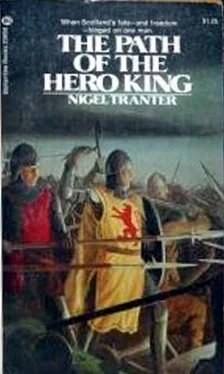formerly evident, to give balance to his eagerness. I perceive that
you have much to tell me, Jamie, he said, taking the others arm.
Come you inside. See, we have a roof above us! A table to sit at.
Even wine to drink. Not only my Lord of Douglas is fine, this day! Come-tell me this of your castle. And where you got all those stout fellows …
That I shall, Your Grace. But there is other news that you should hear first, I think. More urgent. You have heard this of Philip Moubray? The dastard who struck you at Methven field. He is now keeper of Stirling Castle, for his treachery.
I heard. He is moving south, with a sizeable force1,000, they say-to drive me into Pembrokes arms. If he can!
He was, Sire-he was. No longer is.
Bruce paused in the ascent of the stairway.
By this, Sire, he may well be back at Stirling-since, to my sorrow I could not win at him, slay him. But he has few of his thousand with him, that I promise you!
You clashed with them, Jamie? You did?
If you, with 300, could rout 3,000 at Glen Trool -then I, with the same number, was not to shy from 1,000, on my own Douglas moors?
Not 3,000. Half that. The other stroked his chin.
Go on.
It was last night. We were on our way here, by the Douglas Rig pass over Cairntable, when herds of mine brought us word that Moubray had come up from Bothwell and was camped in Kennox Water, making for the Shire Stone pass over to Cum mock-only a few miles east of our route. It seems that he did not know that Douglas was back in Douglasdale! I waited for full darkness, then crossed the heather of Dryrigs and Kennoxhead, and attacked him from two sides, in his valley, without warning. While still he slept.
As… as Your Grace taught me!
Aye. Grimly the King inclined his head.
That is the style of us, this year of grace! And you had them?
We had them. Some escaped, with Moubray..But not many.
Bruce touched the younger mans arm.
God forgive me that I must teach my friends in such school as this, he said.
I, who knighted you!
Douglas raised a laugh, if a harsh one.
I did better than that at Douglas Castle! he said.
You did? The King glanced back at Gilbert Hay and Neil Campbell, who, listening, were following them up the stairs.
Perhaps you should tell us here, Jamie. I have a visitor in the hall.
A priest Is your tale one for priestly ears? I would not have this one esteem us too ill!
Does any whey-faced clerks esteem concern us, in this pass?
Campbell asked.
I think it might do, yes. This once.
So, there in the narrow, dark stairway, Douglas told them stiffly, jerkily.
When I left you that day, I came secretly to Douglasdale, by night. To find evil. Beyond telling. King Edward had given my lands and house to Clifford. My people were ground down.
Harried, slaughtered, raped. What he and his creatures had done to fair Douglasdale! I counted thirty bodies, women and bairns amongst them, hanging in one wood. My people.
None spoke, as he paused.
I understood then, Sire, what you had meant. When you spoke me that night at Tumberry. I saw how much honour meant, and the knightly code! In war. I vowed vengeance. For my poor folk.
And took it.
The King gazed down at his feet.
It is need, sheer necessity, and expediency, that I preach, Jamie-not vengeance, he said.
The other might not have heard him.
Despite their savagery, these English were godly men, it seemed! Of a Sunday, they filled the Kirk of Saint Bride, at Douglas, it was said. Two days after I reached Douglas it was Palm Sunday. Tom Dickson, my steward, said he would attend Mass that day. With others. If there was room for them, with all the English. I said that I was less nice, and would wait outside. The garrison marched out, from the castle-a notable sight. A few of us watched them, from hiding. In the midst of the service, Dickson and his good fellows rose, and drew their steel, hidden till then. We rushed the door from without. We … we let none escape. Of the English. Save only their priest.
Bruce nodded.
I had a notion that this might not suit priestly ears!
Dickson died there. And others, Douglas went on, flat-voiced.
We went back to the castle. They had left it but little guarded.
Even the drawbridge was down. With loads of hay for their beasts, we gained entrance, none suspecting. Said the captain had commanded it. Then we turned on them. It was easy enough. They had left a feast preparing. For Palm Sunday. For all the garrison. Such of my folk as were left in Douglas were near to starvation. I summoned all to the castle. To partake, with us. Before they left. For all must go. None could remain in Douglasdale after that. I took them away, into the Lower Hills, to distant villages and shielings.
They would have had me stay, to be sure. To hold the castle. But my
place is with you, Sire, I told them. Aye, and I told them that I had
rather hear the lark sing than the mouse squeak. This you had taught me also-that holding castles is not for us.
So you left your house again, Jamie? That must have hurt sorely. Even in your fathers best armour!
I left my house, yes. My people took all they might carry that would not delay them. Then all else we took and piled high. In the Great Hall and the Lesser Hall, in the Armoury, the kitchens, in every room. In the gatehouse and every tower and watch-chamber.
In the inner and outer baileys. The English had stocked Douglas well stolen from better men. We took it all, meat and meal, fish and fowl, fodder and bedding. Every stick and stitch of plenishing and furnishing. Every beast that the folk might not take, in their haste, we slew and piled atop-cattle, sheep, swine, even some horses. And atop of these we put the Englishmen, Cliffords captain highest, with his cook. And fired all. Oil and fat there was in plenty, to aid the flames. Douglas burned well. For three hours we could see the smoke of my house, as we led the folk eastwards into the hills. Douglass larder, they named it!
For long moments after he had finished, none found words.
Am I not, Sire, your most apt pupil? the youngest of them grated at length.
The King reached out to grip his steel-clad shoulder, and then turned to renew the ascent of those stairs.
James Douglas did not avail himself of die Holy Sacrament, after his monarch, that night.
Bruce sat his horse, fretting-die same fine stallion which had been Cliffords and which Douglas had insisted his liege lord must use, along with die magnificent armour from Douglas Castle. He had schooled himself to patience and waiting, in his long struggle;
but hitherto it had been waiting for battle to commence, then action. But this May morning it was a greater, sorer test-to sit, inactive, watching, while battle actually raged, battle on a scale unseen in Scotland since Methven, or Falkirk.
That was die point. This was battle, not raid, skirmish, ambush and die like. And he playing general today, not swordsman, warrior, even captain. As he had planned this, his place was here, on die high ground of Loudoun Hill, watching, a spectator. Not even directing-for it was past that stage. There might be work for him, and the small body of men who sat their horses behind him and Hay, some four-score moss troopers as fretful as himself; but not now.
It was foolish to compare this with Falkirk in especial, where King Edward had had so many scores of thousands that he could not bring them all to bear. Here there were only some 5,000 men involved altogether for it was but the van of Pembrokes great army that was engaged, admittedly the cream of English chivalry, but no more than 3,000 in number, it was thought. And 800 or so flanking infantry, running at either side-MacDougall of Lorns Highlanders, sent south in haste. His own force, though die greatest he had commanded since Methven, was but 1,200 all told.
Читать дальше












